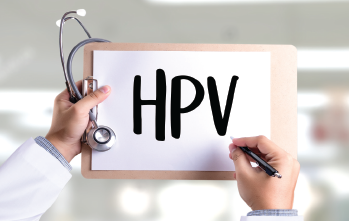
© one photo / shutterstock.com
Your patient has oropharyngeal cancer, and it’s linked to human papillomavirus (HPV). The good news: You get to tell them this is the most highly treatable of oropharyngeal cancers, and their prognosis is excellent. The bad news: Talking to patients and their loved ones about conditions that may have been sexually transmitted can be awkward for you and upsetting to them.
Explore This Issue
October 2019“Physicians should use sensitivity when talking to patients about HPV, recognizing that there may be shame and embarrassment about discussing a sexually transmitted disease,” said Marilene B. Wang, MD, professor in the department of head and neck surgery at the David Geffen School of Medicine at the University of California at Los Angeles.
Sometimes delivering the news can be tricky. Milan Amin, MD, professor of otolaryngology-head and neck surgery and director of the New York University Langone Voice Center, once had a male patient in his 70s who developed HPV-linked benign papilloma lesions in the larynx, a diagnosis that created trouble at home. “He and his wife had an argument about the whole thing and called us to help settle it,” Dr. Amin said. “She wanted to know how he got this and whether it was from cheating on her.” The couple’s minds were put at ease when Dr. Amin explained that the HPV virus can lie dormant in the body for years and then reactivate. And, according to the Centers for Disease Control, in some cases it can even take decades to cause oropharyngeal cancer. “I told her it’s not that this shows he went outside the marriage,” he said. “It’s most likely that both of them have HPV and that somehow there may be this cycle of infection and re-infection occurring and somehow his immune system stopped suppressing the virus and it was able to grow.”
Early in her practice, when she was just learning about HPV and its role in oropharyngeal cancer, Yelizaveta (Lisa) Shnayder, MD, professor of otolaryngology-head and neck surgery at the University of Kansas School of Medicine in Kansas City and co-director of the Fellowship in Head and Neck Oncology and Microvascular Reconstruction, had a patient with HPV-
related cancer of the tongue base. The evening after she gave him the biopsy results, he discussed them with his wife of 40 years, and she admitted a very distant past infidelity. The patient disclosed this to Dr. Shnayder at a subsequent visit, and she wasn’t sure how to react. She told the patient that it was unclear how he came to be infected by HPV. “The patient, however, felt that he and his wife had worked through this and reconciled and became stronger as a couple,” she added. “This situation made me realize how sensitive this discussion of HPV-caused cancers can be.”
It’s not just HPV that may bring on these potentially uncomfortable discussions. Several diseases that present with lesions in the ears, nose, throat, and mouth are—or may be—sexually transmitted. These may include HIV, labial and genital herpes virus infections, and oral or genital papillomas from low-risk HPV types, said Dr. Shnayder. There is also new research showing an association between hepatitis-C and cancers of the head and neck.
In Dr. Shnayder’s practice, she occasionally sees patients with abnormal lymph nodes or oral lesions or cysts in the parotid glands who have HIV. She also sees oral and nasal papillomas (low-risk HPV subtypes 6 and 11) caused by the HPV virus, as well as the high-risk HPV subtypes 16 and 18, which are often implicated in oropharyngeal and cervical cancers.